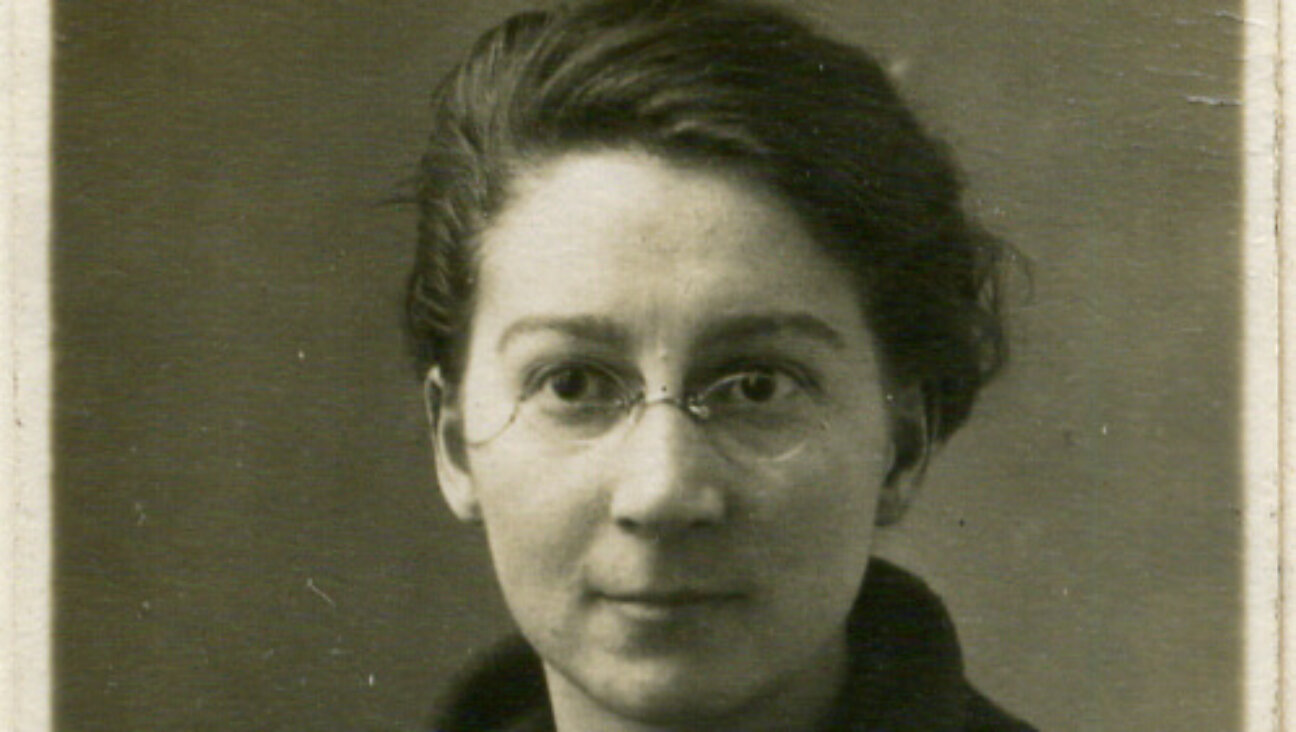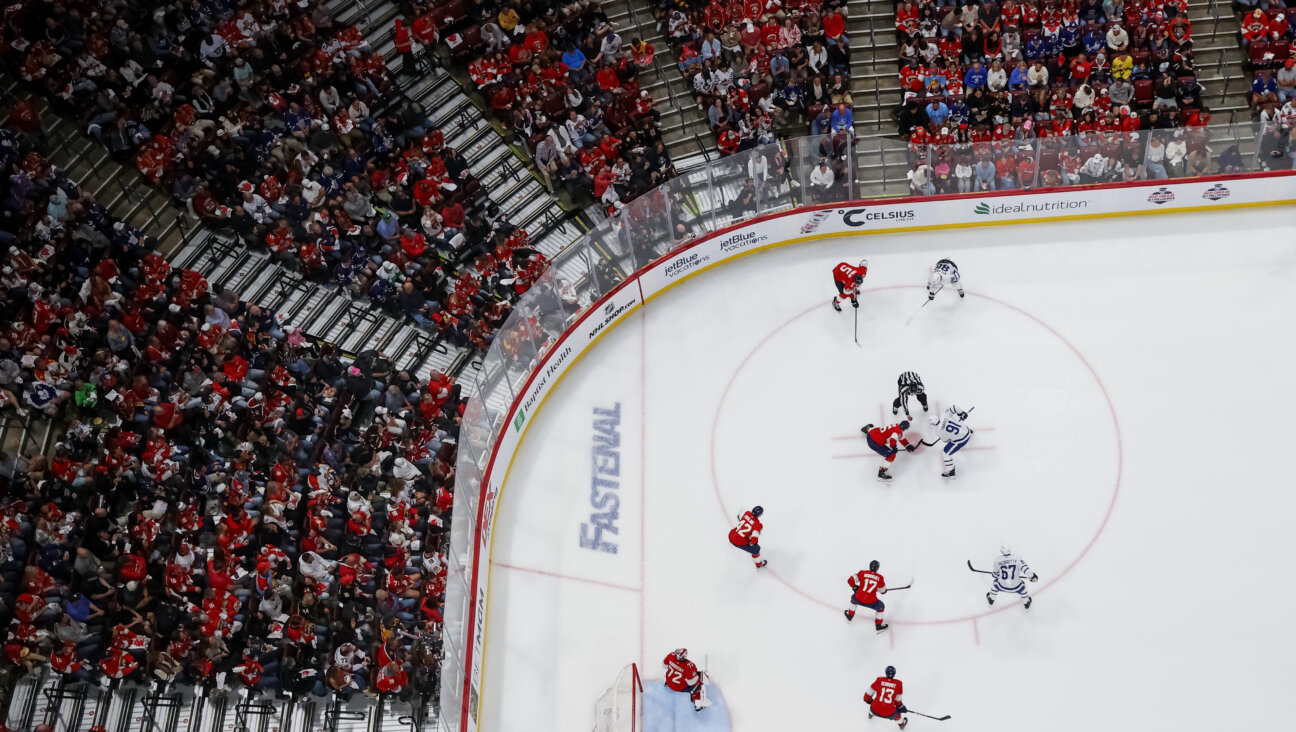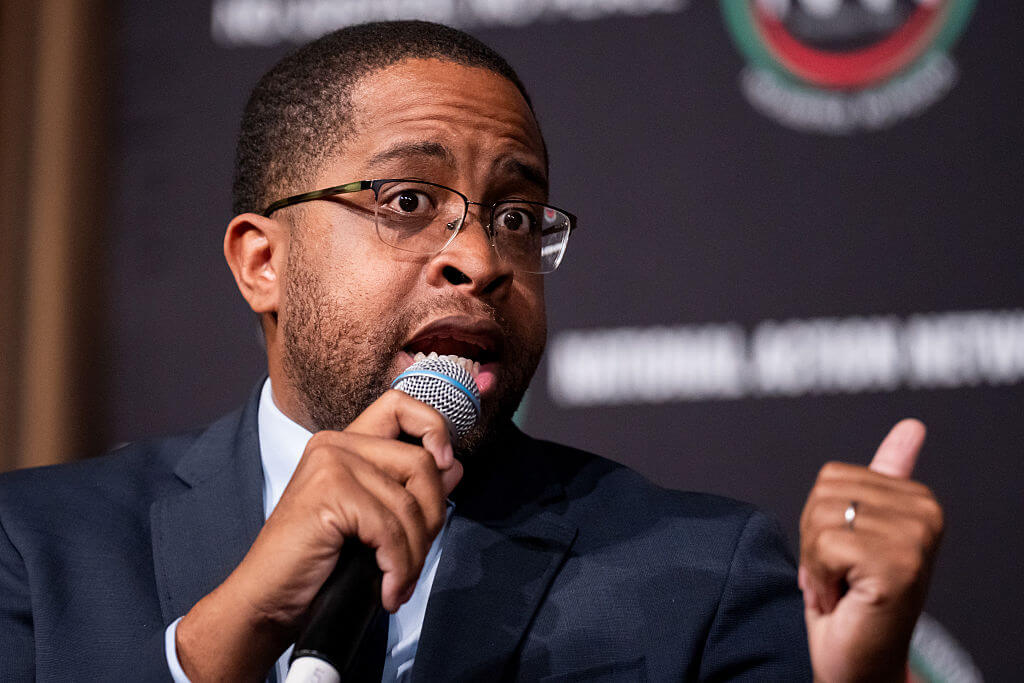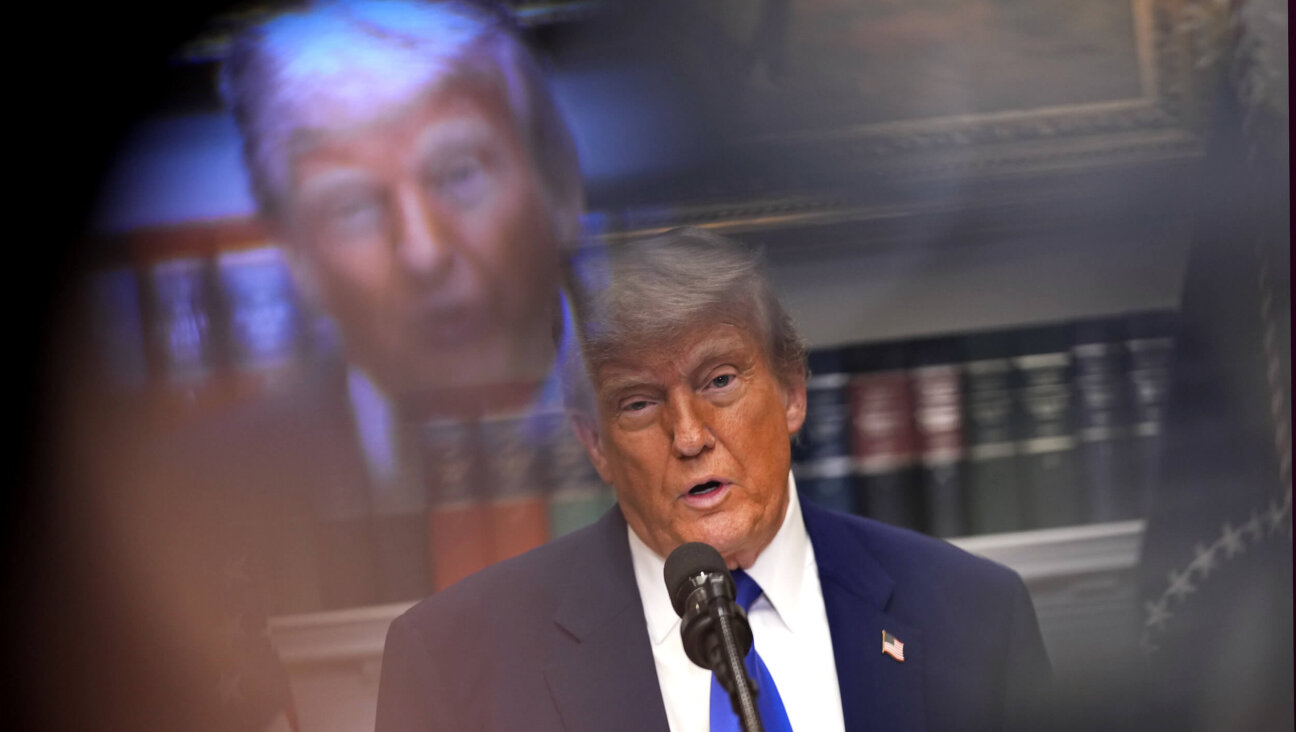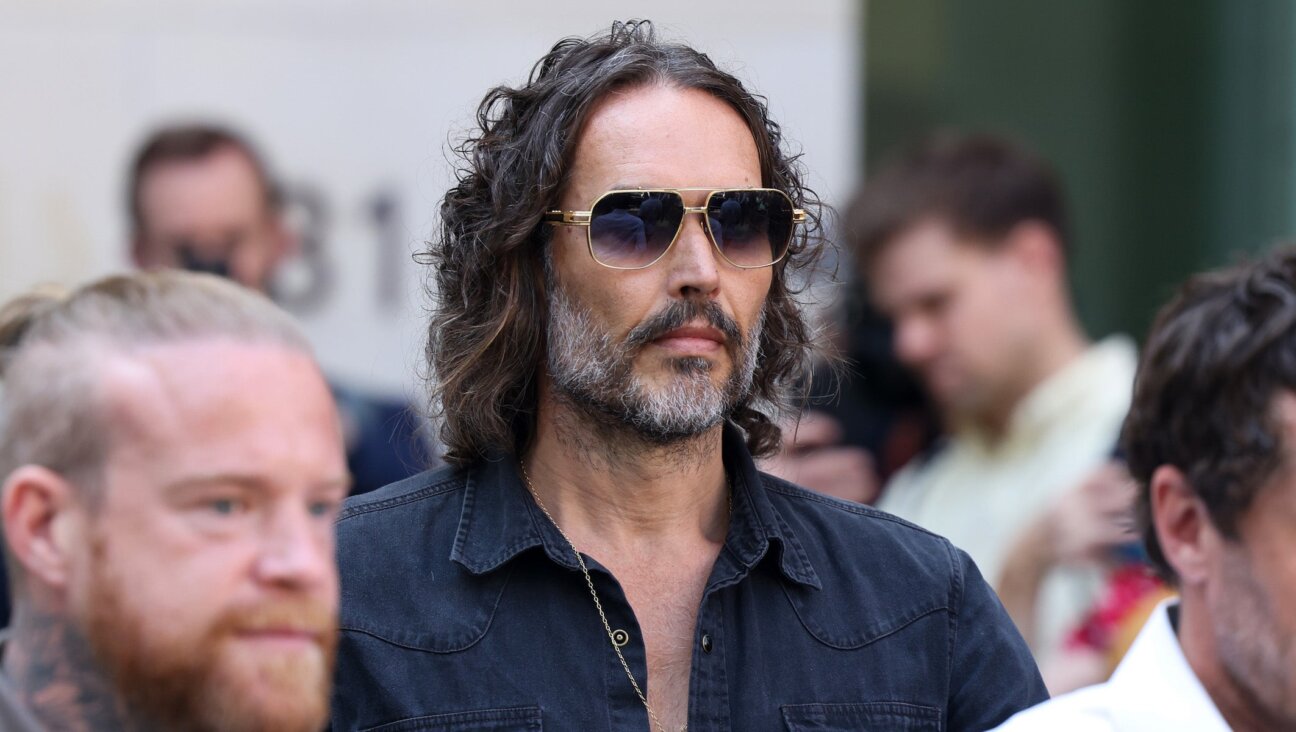Memories Of the Fall

Pondering Liberty: Reagan and Gorbachev can?t face New Jersey. Image by GETTY IMAGES
The buses waited in the synagogue lot. There was already an argument. One mother said the buses shouldn’t idle, it was bad for breathing. For Joseph, her Joey’s asthma. Another father said it was okay. Don’t make them turn off the buses then turn them back on. We were waiting for two more families. The drivers were asleep.

Pondering Liberty: Reagan and Gorbachev can?t face New Jersey. Image by GETTY IMAGES
Washington, D.C., wasn’t like I remembered it from when we’d visit the relatives: the Capitol, the Washington Monument, the memorials to Jefferson and Lincoln, the White House; slow spring vacations half-Passover, half-tourism. No, these were more people than I’d ever seen, heard, smelled, tasted, touched — yes, touched: I was walking on my own, not strollered or carried, and so I was jostled, knocked around not like a baby anymore, but like a person. A Jew. A reformed hippie type sat on the grass of the Mall with an American flag and an Israeli flag; he was stapling, with a staple gun, one to the other, to fashion a doublesided, double-nationed flag. Someone should mass-produce these, if they’re legal — why wouldn’t they be? But I didn’t think any of this then. It was 1987, an extremist winter. My memories of that December day are like the shards of the Wall that were sold later on Berlin streets: fragments only, in all probability inauthentic. I’d just turned 7 years old.
We marched and chanted, like we chant at a Seder, “Let my people go!” “My people” were the Soviet Jews, I was told. Gorbachev was flying in, I was told. From the Kremlin, which was the capital of a country called Moscow. I learned the word “summit” and used it like a kid in a Jonathan Safran Foer novel: “Mom, come here, I want to summit with you.” Gorbachev would be the one, on screen, with the mark on his head. That mark was shaped like a bean (me); a kidney (my father); a kidney bean (my mother); an island (S. Levine); a sickle moon or spilled soda, flavored grape (I forget who said these). Reagan would be there, of course. Reagan was the president, I was told by “the two years in Auschwitz survivor.” He said: “Don’t say Reagan. You always should call him President Reagan.”
Other speeches were made that day, too.
Two years later, the Wall fell. We watched this on television. Berlin was the capital of Germany, but there were two Germanys, and one was beer and sausage and lederhosen, whereas the other was populated exclusively by Olympic athletes who cheated, women swimmers with beards. Not to mention, they were Nazis, every single one. Nazis on steroids. This I gleaned from parental conversation, nightly retellings of the morning’s Press of Atlantic City, which was only a summary of yesterday’s New York Times. On television, like in the frontpage photos, it looked like a bunch of ants in denim were crawling over a sidewalk curb. Like Berlin was under a microscope from biology class, and all the ants were teenagers. “Tombrokaw” I was sure was a first name. Two additional new vocab words: Mauer and Alexanderplatz, the latter of which was also the name of a book on my father’s shelf (red spine, next to my grandmother’s books, which were in German, too).
Three years later, we had two new kids in class, then three, four. Maxim and Mikhail were my friends, and I assume they had no choice but to be friends with each other. Though they spoke no English, already the teachers were teaching them Hebrew. And not even functional Hebrew, conversational Hebrew, but the biblical stuff, the lingua yeshiva. They were “scholarship students.” I showed them the Stephanie Adams centerfold from Playboy (she was the first naked woman they’d seen; she was the first naked black, but also Cherokee, woman I’d ever seen), while the rabbis hit them with Torah and Nach. Rabbi S., returning from the cigarette break that began Gemara class, said that their arrival had been “foreordained” — I’m still not convinced that’s a word. This is the same rabbi who insisted that “misnomer” was Hebrew: mem, samech, nun, mem, resh. The plural? Misnomrim.
Rabbi S. said that the Soviet Jews (but he always said “Russian Jews”) were the last Jews to leave Mitzraim, Egypt. They were the pharaoh’s — they were Gorbachev’s — last slaves. The Wall fell, just like the walls of all our ghettos had fallen. Vilna, Warsaw, Lodz, none could contain us. The Iron Curtain parted like the Red Sea of Reeds. The rabbi quoted Talmud, Sotah 38b: “Not even a curtain of iron can separate the children of Israel from their Father in heaven.” Mechitza shel barzel, he repeated, a saying of Rabbi Joshua ben Levi, given in answer to a question of where to stand to receive the blessing of the priests, the Kohanim. A mechitza is the divider separating men and women in synagogue. Barzel means iron. I guess Winston Churchill — originator of the Iron Curtain metaphor, according to the Internet — had been a great Talmudist, too. Or else some quality in that metaphor must be universally attractive. The union of opposites, perhaps: the curtain, like the curtains of Jerusalem’s Temple, being soft, even diaphanous, coupled with iron, which is martial, so hard as to be murderous. Again, I didn’t think any of this at the time. I was 10 years old.
Before turning 13, M. left school to be circumcised. I visited him in the hospital after. At least the rabbis had the sense to let this be done in a hospital, by doctors and not by a mohel in a shaggy suit. We all visited him, we had to. We brought flowers that our parents bought and candy that we bought, books he couldn’t read and a boardgame, Monopoly. He must have been terribly embarrassed (it was embarrassing for me). While M. was gone, the class was initiated into what had to pass for sex ed: The school was forced to offer nominal sexual education classes to qualify for state funding for textbooks — where the rabbis explained to us thusly: Only after the Russians had their foreskins removed could they have a bar mitzvah, a group bar mitzvah. Without a band, no catering; none of their families had any money. The school cooked cafeteria fare; the school choir sang. It’s a miracle they didn’t become Cossacks that year, genocidal antisemites. Gary Shteyngart, for one, has written humorously about this late-life circumcision phenomenon, and maybe humor is the only way to write about it; nobody will ever write the truth, however, because the truth is excruciating. Maybe making glib dick jokes is the only way to mitigate serious dick trauma. It’s a miracle that M. didn’t become a school shooter, the way he was teased. “Nyet homework help for you, Comrade Cocksnip!”
These notes have been my memories, Joysey-born memories, of communism’s fall. Later (2001–2005), I lived in a few formerly communist countries, but the memories of those years, which were fun and drunken and drugged and sexual and extraordinarily glib, are for another time: for never. When the Hebrew Academy was invaded by Russians, the administration sent out a piece of paper to all the parents — “a flier” — asking them to donate whatever they could: canned goods, clothing. Money. Stuff your charity into a trash bag, then drop it into the bin. My mom and I sat up on a school night, going through sweaters: which were too nice and so I had to keep them (I looked very good in them), and which were old and could be given away. All year, eighth grade, I saw M. in my disgusting old sweaters. Their Gorbachev stains, their stretched collars, inelastic cuffs. And every time I saw him, I said, “Hey, that’s my sweater!” And I saw him daily, as there were only six boys in our class. I feel bad about this still. I didn’t even mean it meanly. The fall of communism meant, more than anything else, that I’d freed up closet space.
Joshua Cohen’s novel, “Witz,” appears in spring 2010 (Dalkey Archive).







